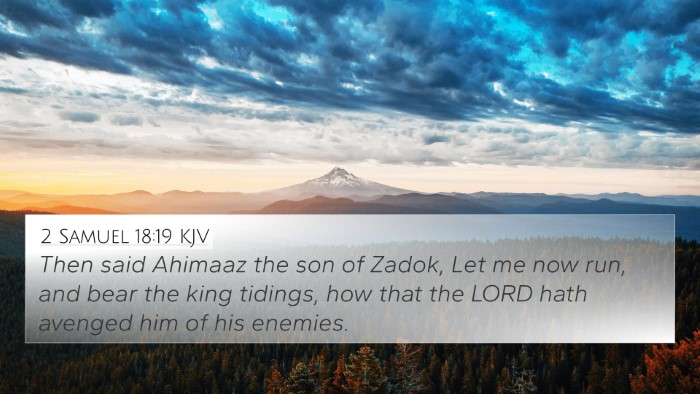Understanding 2 Samuel 18:31
Bible Verse: 2 Samuel 18:31 - "And, behold, Cushai came; and Cushai said, Tidings, my lord the king: for the LORD hath avenged thee this day of all them that rose up against thee."
This verse occurs in a narrative context where King David is awaiting news of the outcome of the battle against his son Absalom. The arrival of Cushai, a messenger, signifies the moment David has been anticipating: news regarding the fate of his enemies and, crucially, his rebellious son.
Verse Meaning and Insights
Various commentaries provide rich insights into the meaning and implications of this verse:
-
Matthew Henry:
Henry underscores the emotional context of this moment in David's life. The word "tidings" signifies not just information but the relief and restoration of heart that comes with answering the long-standing fears and anguish. He notes that the mention of the Lord avenging David highlights God's sovereignty and justice, reminding readers of God's power to enact vengeance for His people.
-
Albert Barnes:
Barnes elaborates on the significance of Cushai as a messenger. He emphasizes the contrast between David's personal turmoil over his son's rebellion and the political and military resolution of the conflict. This duality reflects the complex nature of leadership, where personal feelings often collide with the harsh realities of governance. The focus on God's action in avenging David provides an assurance of divine support even amidst personal loss.
-
Adam Clarke:
Clarke discusses the implications of divine retribution as illustrated in this verse. He points out that the victory over Absalom serves as a culmination of David's trials and a restoration of order within Israel. Clarke notes that the phrase "the LORD hath avenged thee" indicates not only punishment for Absalom but also emphasizes God’s role as an orchestrator of justice, serving as a reminder of God's presence in personal tragedies.
Key Themes and Theological Connections
This verse touches on themes of:
- Divine Justice: The idea that God avenges the wrong suffered by His faithful servants is a recurring theme throughout Scripture.
- Human Emotion: David's complex feelings towards his son Absalom reflect the struggle between familial love and the need for justice.
- Messengers of God: Cushai as a messenger serves as a broader symbol of how God communicates His will and actions through individuals.
Cross-References for 2 Samuel 18:31
To deepen understanding of this verse, consider the following cross-references:
- Romans 12:19: "Dearly beloved, avenge not yourselves, but rather give place unto wrath: for it is written, Vengeance is mine; I will repay, saith the Lord." This verse highlights God's sovereignty in avenging wrongs, akin to His actions toward David.
- Psalm 7:11: "God judgeth the righteous, and God is angry with the wicked every day." This aligns with the theme of divine retribution present in David's story.
- 2 Samuel 15:14: "And David said unto his servants, Arise, and let us flee; for we shall not escape from Absalom." This verse provides context on the conflict between David and Absalom.
- Galatians 6:7: "Be not deceived; God is not mocked: for whatsoever a man soweth, that shall he also reap." This illustrates the principle of divine justice, similar to what happens in the story of David and Absalom.
- Isaiah 61:2: "To proclaim the acceptable year of the Lord, and the day of vengeance of our God; to comfort all that mourn." This emphasizes God's justice in comforting those who suffer.
- 2 Samuel 16:22: "So they spread Absalom a tent upon the top of the house; and Absalom went in unto his father's concubines in the sight of all Israel." This foreshadows the consequences of Absalom's actions, which lead to divine judgment.
- Proverbs 11:21: "Though hand join in hand, the wicked shall not be unpunished: but the seed of the righteous shall be delivered." This reiterates the certainty of divine justice.
- 2 Samuel 18:14: "Then said Joab, I may not tarry thus with thee. And he took three darts in his hand, and thrust them through the heart of Absalom." This is the crux of Absalom's judgment, culminating in the earlier prophetic word declared over the conflict.
- 1 Chronicles 10:14: "And enquired not of the Lord: therefore he slew him, and turned the kingdom unto David the son of Jesse." This emphasizes the importance of seeking God's guidance in times of conflict.
- Matthew 5:4: "Blessed are they that mourn: for they shall be comforted." This relates to David's tragic loss regarding his sons and God’s eventual comfort.
Inter-Biblical Dialogue
The narrative of David and Absalom serves as a case study in God's justice and mercy. This biblical incident invites readers to engage in comprehensive cross-referencing with other biblical texts that discuss justice, rebellion, and the repercussions of sin. By identifying connections between Old and New Testament scriptures, one can illuminate the ongoing dialogue about God’s character and humanity's responses to His sovereignty:
- Exploring the connections between David's kingship and Christ's eternal kingship as established in the New Testament.
- Understanding the thematic connections between David's lament over Absalom's death in 2 Samuel 18:33 and similar expressions of grief in the Gospels, particularly in relation to Jesus’ own lament over Jerusalem.
Practical Application
How to Use Cross-References: For those seeking to deepen their study of Scripture, incorporating a cross-reference Bible study approach can be invaluable. Here are some methods:
- Utilize a Bible concordance to identify verses that relate to key themes such as justice, mourning, and God's sovereignty.
- Engage in a comparative study of passages throughout both Testaments to identify patterns of divine intervention and retribution.
- Implement Bible reference resources while preparing for sermons to find cohesive theological themes that connect various Scripture pieces.
Conclusion
2 Samuel 18:31 encapsulates profound themes of divine justice and the moral complexities faced by leaders. Through a combined study of commentaries and cross-references, readers are encouraged to engage with the text actively, seeking a deeper understanding of God’s character and the narrative of redemption woven throughout Scripture.










